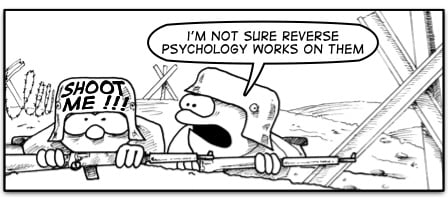Reverse psychology is the way you can motivate someone to do something by telling them to do the exact opposite of it. Reverse psychology should only be used on the person’s subconscious mind and not his conscious mind.
Just knowing what reverse psychology is isn’t enough for you to be able to put it to good use. Learning how to make reverse psychology work for you just might be that little extra to put you one step ahead. The main thing is to NOT let someone catch on to it. So let’s try to understand it.
When to use reverse psychology?
Let’s suppose that your child got bad grades, telling him something like “You will never get higher grades” might ruin his self-confidence, make him believe that it’s really impossible and affect his personality negatively.
After all, if you kept telling someone that he is bad you might program his mind to believe that these traits are parts of his personality and that he can’t do anything about them.
Reverse psychology must only be used when the person knows the actions he should take in order to reach the goals that you want him to reach. In the previous example, the right thing is to motivate the child to study instead of motivating him to get high grades.
Telling him something like “I bet you can never finish your homework tonight” is much more effective and healthier than telling him “you will never get good grades”.
Whereas, in other situations, reverse psychology might come to your rescue, especially if you have a friend who’s always late. In that case, telling your friend “I bet you can’t arrive before 6” might motivate him to do the opposite just to prove you wrong.
Read More: Disturbing Twin Stories That Will Make You Think Twice Before Using #twinning Again
Who to use reverse psychology on?
Not every person will respond to reverse psychology. The people who do are mostly the ones who hate being told what to do. Anyone with a sensitive ego that clouds their judgment is susceptible.
But people who lack self-confidence might actually take your defeating statements and adopt beliefs that affect them negatively and make the situation even worse, so be careful not to use it on them.
Once you managed to challenge someone’s dormant ego without letting him notice that you are doing it on intention you will be able to make that person do whatever you want.
How to use reverse psychology?
The idea is to say something or respond to something in a way that is opposite to what you really think in order to get the opposite response from the other person.
Take any argument for instance. Rather than battling for your own side, simply say that you agree with the other person. The majority of the time they will then decide that you were right after all.
It’s much easier to use reverse psychology when someone is emotional since you want to trigger an immediate reaction. Wait until they get worked up because the more you argue back and forth, the more of a power struggle it becomes, and the more the other person will want to “win”.
Step 1: Identifying the right person to use it on.
Step 2: Wait till they get worked up.
Step 3: Say the opposite of what you’re arguing for but in the same tone.
Step 4: Push it further. Now you’re dominating by roping off an activity, which a rebellious person will not appreciate.
Step 5: Call their bluff.
Step 6: Be ready to follow through. Don’t make empty threats.
Technically, you are using reverse psychology when you intentionally argue in favor of a decision or behavior while secretly wanting the other person to endorse the opposite decision or behavior.
It works because none of us like to be told what to do, so much so, that we often do the opposite of what we’re being pressured to do simply to re-establish our freedom or what psychologists call “autonomy,” perhaps the most powerful non-survival-based motivator.
One important thing to remember no matter when or how you decide to use reverse psychology is that there is a major difference between psychology and manipulation.
Using reverse psychology every once in a while is okay but if you take it too far, don’t have a firm understanding, or try to use it too often, you will quickly become known as a manipulator.
So just keep that in mind and have fun getting people to what you want them to do!
Image Credits: Google Images
Other Recommendations:
http://edtimes.in/2016/07/i-was-bullied-in-high-school-it-ruined-my-psychology-forever/





































